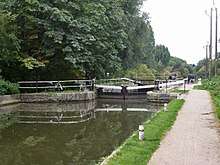Magnet fishing

Magnet fishing, also called magnetic fishing, is searching in outdoor waters for Ferromagnetic objects available to pull with a strong neodymium magnet.[1]
The hobby has been adopted by celebrities such as James Haskell, the English rugby player.[2]
The hobby is a combination of environmentalism and treasure hunting. The magnets used are strong enough to remove large debris such as discarded bicycles, guns, safes, bombs, coins and car tire rims from bodies of water, but many who engage in the hobby are hoping to find rare and valuable items as well.
It is thought magnet fishing was initially started by boaters using magnets to recover fallen keys from the water.[3] Today magnet retrieval tools are specially designed to retrieve items that are lost at the bottom of bodies of water.[4] There are two main types of magnets. These are double sided and single sided magnets.
People who engage in the hobby may be referred to as "magnetfishers," "magneteers," "MF'ers" or "neodemons," (a play on neodymium). With the hobby still in its infancy none of the names has taken root yet.[5]
Magnet fishing and the law
There have been no major reports of magnetfishers failing to observe landowners, local authority regulations concerning outdoor waters, or seeking permissions where appropriate.[6] However it is illegal, and punishable by a ₤25 fine, to magnetfish, or remove any material from canal or inland navigation under the control of the Canal & River Trust in England or Wales, other than the Lee and Stort Navigation, Gloucester and Sharpness Canal, and River Severn Navigation.[7] Trust spokesperson Fran Read stated "Magnet fishing can have its dangers, and consequently it is expressly prohibited by the Trust." An example of this being A news report by ITV Central which included a video of a family recording an incident of one of their children pulling a sawn-off shotgun out of Titford Canal in Oldbury, West Midlands, on Sunday 26 August. They later rang the police and the gun was removed and taken for analysis. [3] The Trust refrains from legal action for first-time offenders.[3]
Amateur magnetfishers in Belgium helped the police by recovering new evidence, specifically firearms and ammunition, related to the crimes of the Brabant killers.[8]
In general, Police urge those that find weapons or similar items to contact them.[3][9]
See also
References
- ↑ "Magnet Fishing". K&J Magnetics. Retrieved 26 April 2017.
- ↑ "Magnet Store Blog". Magnet Store. 2018-02-12. Retrieved 19 June 2018.
- 1 2 3 4 Elliott, Coran (18 August 2018). "Safety warning as rise in magnet fishing hobby sees anglers fish out guns and grenades in UK rivers". The Telegraph. Telegraph Media Group Limited. Archived from the original on
|archive-url=requires|archive-date=(help). Retrieved 23 August 2018. - ↑ "How to Go Fishing With Magnets". Apex Magnets. Retrieved 26 April 2017.
- ↑ "We're called "magnateers?"" (HTML). Reddit. reddit inc. 17 October 2017. Retrieved 20 October 2017.
- ↑ "Is Magnet Fishing Illegal?". Magnet-Fishing.
- ↑ "General Canal Bye-laws" (PDF). British Waterways. British Waterways Board. 1965. Retrieved 21 August 2018.
41. No person unless authorised by the Board in that behalf or otherwise legally entitled so to do shall: (d) Dredge or remove coal or other material from any canal.
- ↑ "'Magneetvissers' bezorgen dozen met munitie en wapens aan speurders Bende van Nijvel" (HTML). De Standaard (in Dutch). Antwerp, Belgium: Nieuwsblad.be. Raad voor de journalistiek. 26 October 2017. Retrieved 27 October 2017.
- ↑ "What to do if you find a gun while magnet fishing". www.magnetfishingpros.com. 2018-09-15. Retrieved 26 September 2018.
